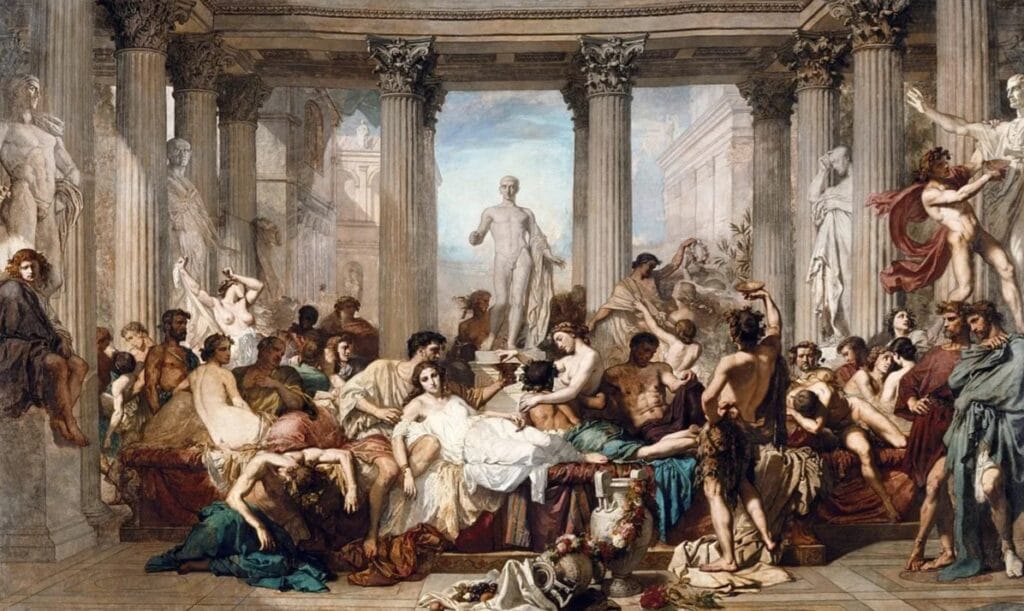
In a Roman household sex was in plentiful supply. Except, so it seems, between the actual married couples. The existence of slaves in the house naturally mean that, particularly the men, but also the women (although with the risk of pregnancy and disgrace), had access to sex whenever they so required.
Roman sexuality in its pagan times is perhaps hard to understand by western society with its values heavily influenced by Christianity.
To a Roman sex did not create any kind of bond between two people. It created no obligation between one side and the other. And, for the man at least, there appeared no reason why he should not share many sexual partners, – as long as it didn’t get him into any form of trouble.
What is peculiar though is that, whereas even the sharing of a meal created a form of social relationship with a person, having sex with them did not.
Marriage was a contract between a woman and a man, but it did in way require them to love each other.
If Romans saw marriage as an institution brought about by civilization, then sex to them had nothing to do with civility. In fact it was the direct opposite. It was where the animal still resident in man revealed itself. There was no shame in sexual acts at all. And yet it was seen as indecent to treat it as anything else but a private matter. So, it was definitely not something one talked about.
As far as the law was concerned then sex with slaves was not adulterous. Or at least not for men. And sex with a free-born man or woman was only adultery if they were not doing it for money. Thus, sex with a prostitute did not constitute adultery.
However, adultery with a free-born was a crime, stuprum. And for this there was only one punishment; death.
So as long as one steered clear of committing stuprum, anything was allowed. There was no limits on age and also none on gender.
However, if Rome was a tolerant society in law, then socially it was still not acceptable to be seen to practice sex in excess. This was deemed a flaw in a Roman’s character, making him disreputable.
And if the majority of Romans treated sex with a embarrassed silence, then it was expected that everyone else did so, too.
Worst of all was it to follow the example of the Greeks, who saw sex as some form of pleasurable art. That in Roman eyes was decadent, perverse, if not barbaric. Sex offered many social pitfalls to a citizen. If it followed no particular rules, then its practice could reveal weaknesses about the man.
The worst weakness ever to be discovered in a man was ‘effeminacy’. in fact it was perhaps the worst insult known to Romans to be called effeminate.
For an effeminate man was soft, he had become weak and girlish in the eyes of his fellow countrymen. The easy life had made him so, particularly if he enjoyed sexual relations too much. Such a man become both a homosexual and a womanizer in the eyes of others. Paradoxical as that might be, it was the Roman way. And few were safe from being deemed effeminate. Even Pompey the great general who had led forces into the east and conquered huge sways of territory for Rome, was deemed an effeminate lecher for his excessive love for Julia – his own wife !
If slaves were all bound not merely by ownership but by loyalty (fides) to a particular household, then the rejection of one of the men’s advances could be seen as more than disobedience, but betrayal of sorts. And if the man did refrain from forcing the slave to obey, then it was not necessarily out of respect of the slave’s shared humanity, but could well have been due to his own desire to restrain himself. Self-control and restraint, inner discipline, was a virtue sought by all Romans. To be able to curb his desires and show inner strength both to himself as well as to his slaves will have no doubt made many a master not abuse his powers to too great an extent.
However, the fact that a family would live under the same roof with slaves who had shared the bed with some of the family members. This could lead to some confusion about the relation between slaves and masters. For the children of the slaves might well be half sisters or brothers of the Roman children of the household.
In such situations there was naturally the possibility of incest. Though indeed it would be not seen as such. For incest was only deemed so when involving members of your own ‘official’ family.
But if the master of the house was sleeping with the daughter of a slave who had been a former mistress this was not deemed to be so, despite it being very well possible that the girl was in fact his daughter.And if it were not the master himself, who was to say that his son might not share a bed with the girl, who might be of a similar age to him. If biologically they might be half-sister and half-brother, the law saw nothing wrong with it. And for all the confusion and secrecy about sex in the household, they might well not have known about their shared parentage.

Historian Franco Cavazzi dedicated hundreds of hours of his life to creating this website, roman-empire.net as a trove of educational material on this fascinating period of history. His work has been cited in a number of textbooks on the Roman Empire and mentioned on numerous publications such as the New York Times, PBS, The Guardian, and many more.
